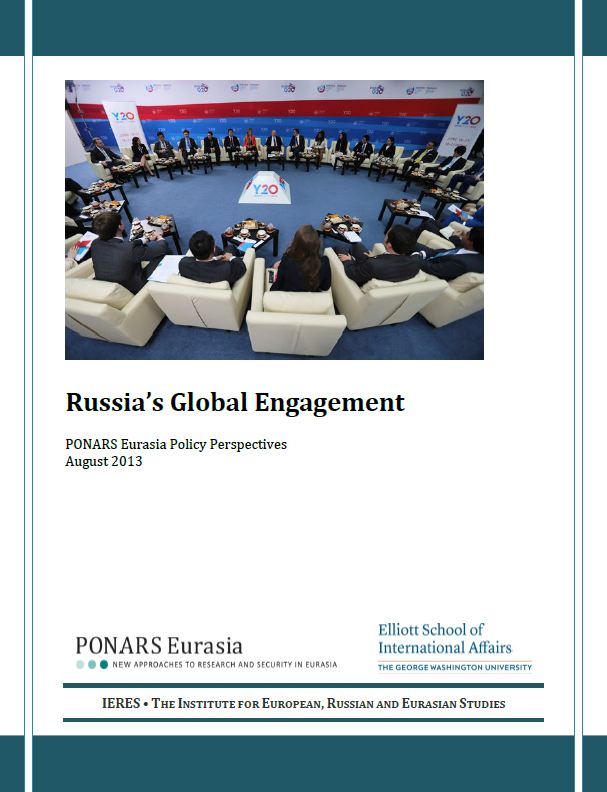This collection of policy memos is based on the proceedings of a May 2013 workshop of the Program on New Approaches to Research and Security in Eurasia (PONARS Eurasia), held in collaboration with the European University at St. Petersburg. The workshop, “Russia’s Global Engagement,” brought together scholars and experts based in the United States and the Russian Federation, as well as Armenia, Azerbaijan, Canada, Estonia, Georgia, and Ukraine. Participants discussed Russia’s international position and U.S.-Russian relations; shifting Russian policies on energy, Asia, migration, and international economics; Syria, terrorism, and arms control; and military reform. We originally published the policy memos prepared for the workshop between April and August 2013, and we are republishing many of them in two collected volumes.
This volume, Russia’s Global Engagement, includes sixteen contributions on the nature of Russia’s engagement with the West and rising powers; the deficit of trust that characterizes U.S.-Russian relations; the political economy of energy and Russia’s “pivot to Asia”; and the Syrian conflict.
In Part I, Serghei Golunov analyzes the strengths, weaknesses, and limitations of Russian “whataboutism,” a strategy of appealing to Western experience to justify undemocratic or unpopular moves and to neutralize Western criticism. Viatcheslav Morozov examines the Russian “nationalization of the elites,” a policy that seeks to limit elite connections to the West while underlining Russia’s dependence on the West and its inability to sustain total isolation. Vladimir Gelman argues that Russian acceptance of the country’s status as a “C-student” has led to the rise of a “mediocrity syndrome” that contributes to escapism and the rejection of “A-student” ideas and values. Andrey Makarychev observes that while chairmanship in international organizations can be a form of soft power, Russia’s priorities in the organizations it chairs are largely inconsistent with or irrelevant to its actual policies or those of other major powers. Ayşe Zarakol argues that the “rising powers” literature offers few positive notions about Russia’s future prospects, whether as an “emerging market” or “rising power.”
In Part II, Ed Ponarin explains why Russian elites and the public-at-large have been shifting away from a pro-American attitude since the early 1990s and why we can expect U.S.-Russian relations to improve only in the long run. Ivan Kurilla argues that we can more accurately evaluate the current state of U.S.-Russian relations and find ways to improve upon it by emphasizing points where Russian and American identity and views of history converge. Mikhail Troitskiy examines a central aspect of the relationship – the status of the two states as nuclear superpowers – and argues that prospects for nuclear disarmament depend on the ability of the United States and Russia to critically review and adapt their nuclear postures.
In Part III, Juliet Johnson questions whether the efforts of Russia, China, and other BRICS states to reinforce economic cooperation and create alternatives to existing international institutions can effectively challenge the status quo. Vladimir Popov upholds the developmental logic of reserve accumulation (exchange rate protectionism) practiced by countries like China and Russia as a way to favor investment, exports, and growth at the expense of wages, consumption, and imports. Gulnaz Sharafutdinova analyzes the reaction of the Russian government and Gazprom to the “shale revolution” in energy production and highlights the latter’s longer-term implications on Russia’s economy and politics. Andrew Kuchins argues that Russia’s “Asia Pivot” requires Russia to deepen its ties with China, especially for the development of its East Asian resources, while it improves ties with a wide variety of other Asian neighbors, including the United States. Relatedly, Elizabeth Wishnick analyzes Russian relations with China and Southeast Asia in the context of disputes over maritime boundaries and energy resources and outlines the growing role of Southeast Asia in Russian trade and security policy.
In Part IV, Pavel Baev explains how Russia has scored more than a few points in the complex diplomatic maneuvering around the Syrian conflict and assesses how regime collapse could change Russian policy. George Gavrilis explores lessons that may be applied to conflict resolution in Syria from the international mediation efforts that helped bring the Tajik civil war of the 1990s to an end.











